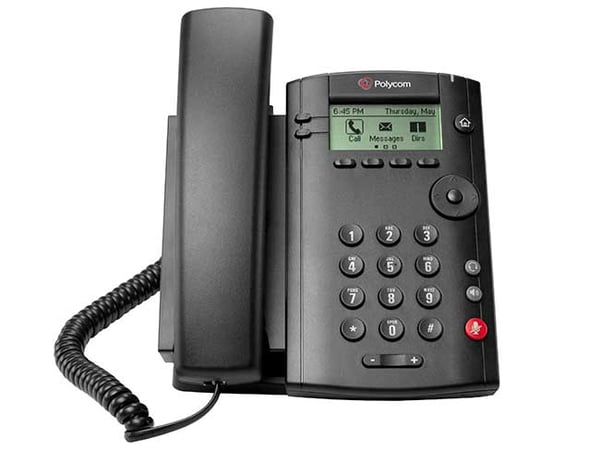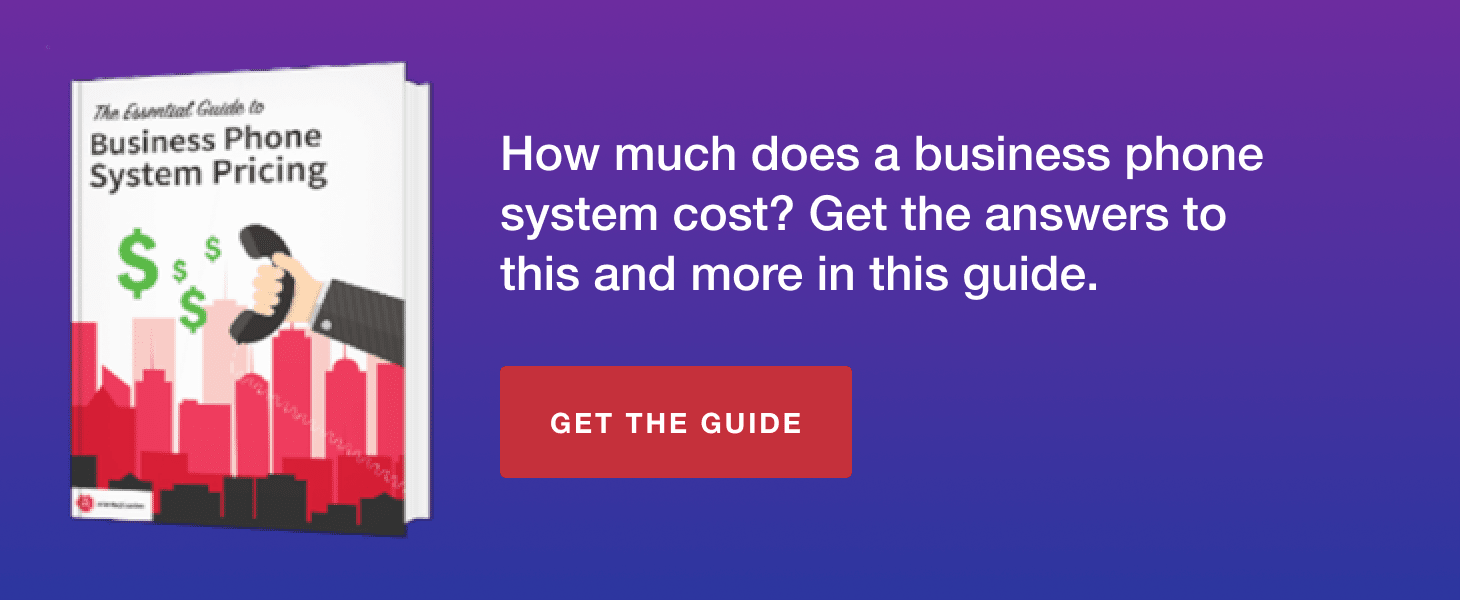What is the Best Small Business Phone System?

Phone systems are a big investment with a long-term impact for small businesses. If you get the wrong system, you could have problems. If you go cheap, you could suffer additional expenses when you try to scale for growth. If you go expensive, you could pay for a lot of bells and whistles you don't need, which would put a strain on your budget.
Some of the features that you'll typically get with small business phone systems are:
- Support for multiple lines
- On-hold music and announcements
- Automated Attendant
- Automatic Call Distribution (ACD)
- Voicemail
- Conference calling
We'll outline everything you need to consider to find the best phone system for your small business.
Anatomy of the Best Small Business Phone System
Here are the elements used to build your small business phone system.
Phone Types
For every type of use case, there is a phone model to fit it. Costs will vary depending on whether you select a high-end phone brand or a generic option. Your options could include:
- Screen Type: Color screens, grayscale screens, and screen-less phones are three common options. Sizes of screens can also range significantly.
- Buttons: The number of function buttons on business phones can range from 2-12.
- Wireless Options: Certain jobs or environments may require wireless phones that can be physically transported throughout the office or work site.
- Audio Definition: You may choose to upgrade standard audio to HD audio.
- Phone Size: The size of business phones can vary significantly, from large phones designed for conference rooms, to “standard” sized desk phones, to small, lightweight wireless models.
Phone features are closely tied to the types of phones your business requires. You will need to determine if some or all of your phones will need features like 3-way calling, intercom, call waiting, holding, transferring, speed dial or automatic callback.
Some of the more popular small business phone models are Polycom VVX, Cisco 68xx, 78xx and 88xx series phones, and Yealink phones. I have a Polycom VVX 500 on my desk at the office. At my home office, I use a Polycom VVX 400.

Service Types
There are three basic small business phone service types.
Plain Old Telephone Service (POTS)
Also known as analog lines, POTS is the traditional method to support making and receiving phone calls over the Public Switched Telephone network. With the many benefits of data network services, there aren't many cases where POTS lines are the best way to go. Usually they are only need when a device needs a loop start. Gradually, the ILECs are phasing out POTS service and in many areas of the country, you can't even order it, anymore. For instance, Hurricane Sandy wiped out most of the copper infrastructure in New York/New Jersey and Verizon did not repair. They replaced it with fiber and wireless infrastructure.
PRI Lines
Primary Rate Interface (PRI) is a T-1 transmission technology that has been widely used to support voice communications for over 50 years. It’s an interface standard used to deliver multiple lines of voice and data through physical copper lines that are part of your building’s physical infrastructure.
PRI usage is on the decline. Many companies are moving from PRI to phone service delivered over a data network for some of the following reasons.
- PRI is expensive to implement and upgrade and is typically associated with costly monthly phone service fees
- May require long-term contracts with traditional telecom companies for local and long distance calling
- Requires dedicated capacity that can only be purchased in 23 line units
- Slow to scale, modifications to infrastructure may take weeks of waiting.
VoIP & SIP
The vast majority of small businesses are now using data network services delivered over fiber optic lines for their telephone service. Many of my customers are electing to use Voice over IP (VoIP) that we deliver to them using Session Initiation Protocol (SIP).
VoIP generally refers to voice calls delivered over internet data lines. The SIP protocol supports the signaling and control of voice, video, and messaging applications. Hosted SIP Trunking service is generally provided by a hosted Unified Communications vendor who may offer VoIP and Unified Communications as a Service (UCaaS).
We find that most small businesses get the most value from SIP Trunking for some of the following reasons.
- Offers the potential for immediate cost savings on business applications by allowing companies to consolidate technologies into Unified Communications.
- Provides failover to employee mobile devices if data connectivity is lost.
- Can provide extreme flexibility in pricing by allowing businesses to purchase add-on features and "lines" (call appearances on a SIP trunk) as they need them.
Generally speaking, you'll find that the benefits of data network services such as VoIP and SIP are far greater than PRI lines because you have less dedicated hardware and there are more providers to choose from.
How Much Do Small Business Phone Systems Cost?
There are a couple of ways to evaluate the costs for a small business phone system. If you're adding or replacing handsets or other hardware, you'll have to determine up-front costs separate from ongoing service fees.
Handset Hardware
The one-time investment on handsets is fairly easy to estimate. If you are purchasing more than 20 or so handsets, you'll want to inquire about bulk discounts. The more popular models of handsets fall in the following price ranges.
- Low-end: $200
- Mid-range: $400-600
- High-end: $1,000
Phones can also be provided for a monthly fee. As opposed to a capital expense, this would make them an operational expense. Other advantages are that the phones can be shipped pre-configured. And, the device can be replaced at no additional expense if it breaks or becomes defective.
Ongoing Services
While service fees can vary tremendously based on the organizational need, we can't provide a ballpark figure. These services will have to be evaluated by a potential provider who can then deliver a quote. But we can tell you which factors will impact the service fee. Those factors include:
- Number of Users
- Number of Sites
- Phone Model
- Add-On Phone Services
- Layer of Redundancy
- Type of System Selected
- Required Training
- Annual Maintenance Requirements
To learn more about the costs of business phone systems, download our free eBook The Essential Guide to Business Phone System Pricing.
What to Look for in a Small Business Phone System Provider
The best small business phone systems are no better than the provider that supports them. You'll invest a lot into planning, hardware, and setup, so don't skimp on service. Think through the following factors as you choose a service provider.
Availability
The starting point for finding the best service provider is determining what your options are. Atlantech Online, Inc. is a public utility in Maryland, Virginia and the District of Columbia that provides telephone, Internet and data center services. If you're in the DC metro area, check to see if we provide service to your building already.
Consolidated Services
Does the service provider have their own network? By putting office connectivity, phone, and servers on one network you'll enjoy better performance and managing your data and communications will be a lot easier. Are the data centers state-of-the-art and easily accessible?
Customer Support
You can burn a lot of expensive employee hours dealing with service providers that are unresponsive or don't know what they're doing. Make sure that your potential provider has great phone support and that their field technicians are well-qualified and get good reviews.
Ask the Right Questions
You're well on your way to finding the best phone system for your small business. As you begin evaluating systems, there are a few more questions which you'll want to get answers to before making a commitment. Questions such as:
- What are the line limits or cost for larger workforces?
- What kind of tech do we need for the phone service operator?
- What kind of contract should we sign (if any)?
Those are three of the questions included in our free download 10 Questions to Ask Before Buying Phone Service. Get your free copy now and sleep well knowing you've covered your bases on this vital business decision.


